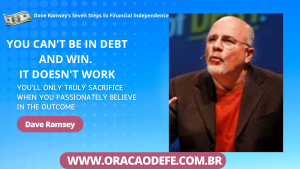
Dave Ramsey’s Seven Steps to Financial Independence
Dave Ramsey is an author and motivational speaker who became famous for his radio show The Dave Ramsey Show. Ramsey is an advocate of the “emergency personal finance” method, which emphasizes the importance of creating an emergency reserve before starting to invest. He is also an advocate of debt payment, including credit card debts.
However, based on the style of Dave Ramsey and his previous work, it is possible to offer an overview of how he would approach the topic of “spending problems” and what to do to progress:
-
Recognition of Financial Problems:
– Dave Ramsey often emphasises the importance of recognising and tackling financial problems. It encourages people to honestly assess their financial situations, including debt, excessive spending and other harmful habits.
-
Budget and Spending Control:
– Ramsey is known for advocating the creation of a sound budget. He suggests that people analyze their spending in detail, eliminating unnecessary expenses and focusing on key financial priorities.
-
“Envelope” method for expenditure:
– Ramsey often recommends the “envelope” method for variable expenses, where individuals place money in separate envelopes for specific categories such as groceries or entertainment. This helps maintain tighter control over spending.
-
Financial Emergency and Debt Elimination:
– A crucial part of Ramsey’s philosophy is the creation of an emergency reserve before focusing on debt elimination. He suggests building an emergency fund to avoid resorting to debt in unforeseen situations.
-
Investments and Wealth Building:
– After eliminating debt, Ramsey advises investing for wealth building. He often highlights the importance of investing smart and long-term.
Dave Ramsey recently appeared on the podcast “Erika Taught Me” to explain how “100% of us have spending problems” and what you should do to progress.
Dave Ramsey appeared on the podcast “Erika Taught Me” on November 7, 2023 to discuss his seven steps to financial independence. He explained that these steps are based on his own bankruptcy recovery experience and that they can help anyone achieve their financial goals.
According to Dave Ramsey, there are 7 steps to achieving financial independence. These steps are known as Dave Ramsey’s “Baby Steps”. Here they are:
-
Save an emergency fund:
The first step is to create an emergency reserve that covers 3 to 6 months of basic expenses. This will help to cope with unforeseen events without resorting to debt.
Create the first $1,000 emergency fund
One of Ramsey’s fundamental principles is that you need a $1,000 emergency fund before embarking on your wealth-building plan. Ramsey acknowledges that $1,000 is not enough to cover all of life’s emergencies, but takes care of the most common financial “emergencies” that people encounter often when they’re starting out, from the need for medicines for children to the need to buy new tires the car. Once this “initial” emergency fund is in place, Ramsey says that you can follow the rest of your small steps, such as paying all debts (outside your home), building a proper emergency fund, and saving/investing aggressively.
-
Pay off all debts except mortgages:
Focus on paying off all your debts, starting with the least valuable ones. Use the method known as “Snowball” to gain momentum and motivation by seeing your debts being eliminated one by one.
-
Save for retirement:
After paying off your debts, start investing for retirement. Look for long-term investment options such as private pension funds or retirement plans offered by your employer.
-
Save for the education of children:
If you have children, start saving for their education. Consider opening a specific account for this purpose, such as an educational pension plan or a long-term investment account.
-
Paying the mortgage:
After paying off all your debts, focus on paying your mortgage as soon as possible. Consider making extra payments or refinancing your mortgage to reduce payment time.
-
Building wealth:
After paying off the mortgage, focus on building wealth and increasing your investments. Consider options like investing in real estate, investment funds or starting your own business.
-
Giving and leaving a legacy:
Finally, when you achieve financial independence, you can dedicate yourself to philanthropic causes and leave a legacy for future generations. Consider donating to charities or creating a donation fund.
These are the 7 steps to financial independence according to Dave Ramsey. Following these steps can help improve your financial situation and achieve financial freedom over time.
Ramsey also talked about the importance of the right financial mindset. He believes that people need to change their mindset about money if they want to achieve financial independence. They need to learn to live below their means and focus on the long term.
The podcast was well received by listeners. Ramsey was praised for his practical and inspiring advice.
Here are some of the highlights of the interview:
Ramsey said debt is the biggest obstacle to financial independence. He advised people to get out of debt as soon as possible, starting with credit card debts.
He also spoke about the importance of living below your means. He said people need to learn to control their spending if they want to save money.
Ramsey emphasized the importance of focusing on the long term. He said people need patience and perseverance if they want to achieve their financial goals.
Discover the common sense
Ramsey repeatedly emphasizes that following the path of financial success is not rocket science. For him, the steps and principles to build wealth are actually common sense and are the basis of the “baby steps” he uses on his own financial platforms. Some of the most important common sense tips are:
Live with less than you earn
Get out of debt (and stay out of debt)
Have a plan/budget
Ramsey admits that while it can be difficult to acquire these habits, they are essential if you want to build wealth – and it’s actually very easy if you dedicate yourself to it. Living on less than you earn allows you to set aside money for your future – or to pay off debts, which is the scourge that ruins all financial plans.
Ramsey says his most powerful wealth-building tool is his income, so it’s necessary to protect it and avoid sending it to banks in the form of interest payments, which essentially amounts to flushing that money down the toilet.
Ramsey says you can’t borrow to get wealth, regardless of what he calls an illusion that you can borrow at low rates and reinvest at higher rates. According to Ramsey, this neglects factors such as taxes and risks. Ramsey says that most people facing financial problems don’t understand risk-adjusted returns and should only follow the basic principles of common sense.
Snowball
Ramsey is famous for his endorsement of the “debt snowball” method to pay off debts, as opposed to the “avalanche of debts”. With the debt snowball, you will direct all your money first to the lowest debt, until it is paid off. Then, you will start paying the next smallest debt. This opposes the avalanche of debts, in which you first pay your debt at the highest interest rate.
Ramsey acknowledges that the debt snowball is “mathematically incorrect”, as it will theoretically pay off less money by first eliminating debt at higher rates. But he believes that the snowball of debt is actually “financially correct,” which is different.
Ramsey says that, both anecdotally and through his own investigation, people are much more likely to follow a debt repayment plan if they make a series of small gains by first paying off their smaller debts. According to Ramsey, the avalanche of debt requires a level of financial discipline that, in behavioral terms, most people simply don’t have.
Clarity of purpose is motivational
One of Ramsey’s core beliefs is that it will not be possible to succeed in long-term wealth building unless you have a focused and disciplined path. So he developed his baby steps, so that people have an easy and targeted method to get out of debt and achieve financial prosperity.
According to Ramsey, it’s easy to get distracted from financial planning and it’s even easier to get seduced into spending unnecessarily, since marketers are very effective at getting people to open their wallets. Following a relatively simple, common-sense plan offers the best chance of success, as it eliminates the paralysis of analysis that can come from many options.
The end result
Ramsey’s essential message is that when it comes to getting out of debt and building wealth, slowness and firmness don’t win the race. Instead, you have to aggressively dedicate yourself to fixing your financial base or spend your entire life in debt or trying to catch up with your savings.
If you can “go crazy” for 18 months or two years, in most cases, you can get out of debt and start building a financial foundation that will serve you for the rest of your life.





